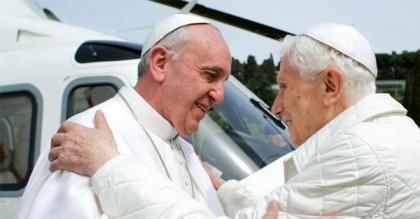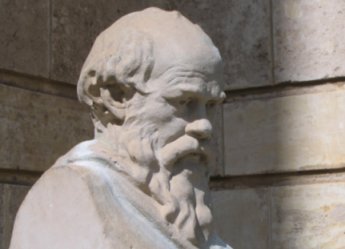Towards a Spirituality of Unknown Variables
Devra Torres | Oct 1, 2013 | 1 cmt
A few days ago, this improvised prayer was going around facebook (where I do much of my philosophical research):
Heavenly Father, Help us remember that the jerk who cut us off in traffic last night is a single mother who worked nine hours that day and is rushing home to cook dinner, help with homework, do the laundry and spend a few precious moments with her children. …

Remind us, Lord, that the scary looking bum, begging for money in the same spot every day (who really ought to get a job!) is a slave to addictions that we can only imagine in our worst nightmares.
Help us to remember that the old couple walking annoyingly slow[ly] through the store aisles and blocking our shopping progress are savoring this moment, knowing that, based on the biopsy report she got back last week, this will be the last year that they go shopping together. …
And so on.
I don’t know of anyone who disapproves of compassion. It’s a safe bet that other people have their problems.
Still, this kind of plea rubs some the wrong way. It smacks of bleeding-heart liberalism;

it seems to imply disregard for objective norms and high standards. If we direct our attention to a murderer’s unhappy childhood, we’re not doing him any favors, some would say, Explaining away somebody's evil (or just obnoxious) conduct harms both him and his victims.
I agree: objective standards can’t be held hostage to sentiment, and justice can’t be enacted only after a never-ending examination of every real and imagined difficulty the offender has ever faced.
But there’s a fine line between upholding objective standards and assuming that we have enough information to know that someone has fallen short of them. It’s one thing to have mercy on a sinner; it’s another to assume we can tell he’s a sinner in the first place.
Recognizing our limits is actually the most realistic approach of all, because it at least acknowledges the simple fact that we’re laboring under an enormous lack of information.

C.S. Lewis makes the point in Mere Christianity
Some of us who seem quite nice people may, in fact, have made so little use of a good heredity and a good upbringing that we are really worse than those whom we regard as fiends. … We see only the results which a man's choices make out of his raw material. But God does not judge him on the raw material at all, but on what he has done with it. Most of the man's psychological make-up is probably due to his body: when his body dies all that will fall off him, and the real central man, the thing that chose, that made the best or worst of this material, will stand naked.
All sorts of nice things which we thought our own, but which were really due to good digestion, will fall off some of us: all sorts of nasty things which were due to complexes or bad health will fall off others. We shall then, for the first time, see every one as he really was. There will be surprises.
Dr. Ray Guarendi notes a similar phenomenon among armchair theologians who leap from, say, “I don’t see why God would allow evil” to “I don't believe in God” or from “I don’t see what's wrong with birth control" to "The rule against it it can safely be ignored."
We don’t know all the variables. We know only a tiny fraction of them.

We jump from “I don’t get this” to “This makes no sense.” Or from “I don’t see why He does this” to “I could do a better job.”
And Katie makes a similar point in regard to the Pope’s interview.
(No, not today's: the longer one in America magazine. And hang onto your hats, because rumor has it that he plans another one, on women, a thought that makes even a Francis admirer like me a little queasy).

Some have said he’s naïve, imprudent, out of touch. One woman even announced confidently that he has “a problem with pride.”
But, as Katie asks rhetorically, (in the comments on her piece, “On minding our own beeswax and letting the Pope be Pope”):
Have we been privy to his conversations with the Pope Emeritus?

With the world's bishops and Cardinals?
Have we been admitted to the intimate secrets of his private prayer life? Do we feel how the Holy Spirit may be inwardly prompting him?

Do we have his decades of experience as a priest, bishop and Prince of the Church? Are we acquainted with his personal strengths and weaknesses?
In short, are we in any position at all to justly evaluate the merits of his prudential judgments as Pope? Is a footsoldier on duty in a remote corner of a complicated military operation in a position to evaluate his General's strategic decisions?
So the point is not whether we should tactfully avert our eyes from other people’s weakness, cut them some slack, or be merciful instead of realistic. The idea is to rise to the level of a little Socratic ignorance.



Comments (1)
Patrick Dunn
Oct 3, 2013 8:54am
This article offers a take on Francis, and it may be relevant here because it particularly discusses his view of conscience, which in the assesment of the author is "subjective."
Though I am trying to remain 'open' to Pope Francis and striving to understand what he is actually saying, I continue to have a sense that there is something very much off the mark.